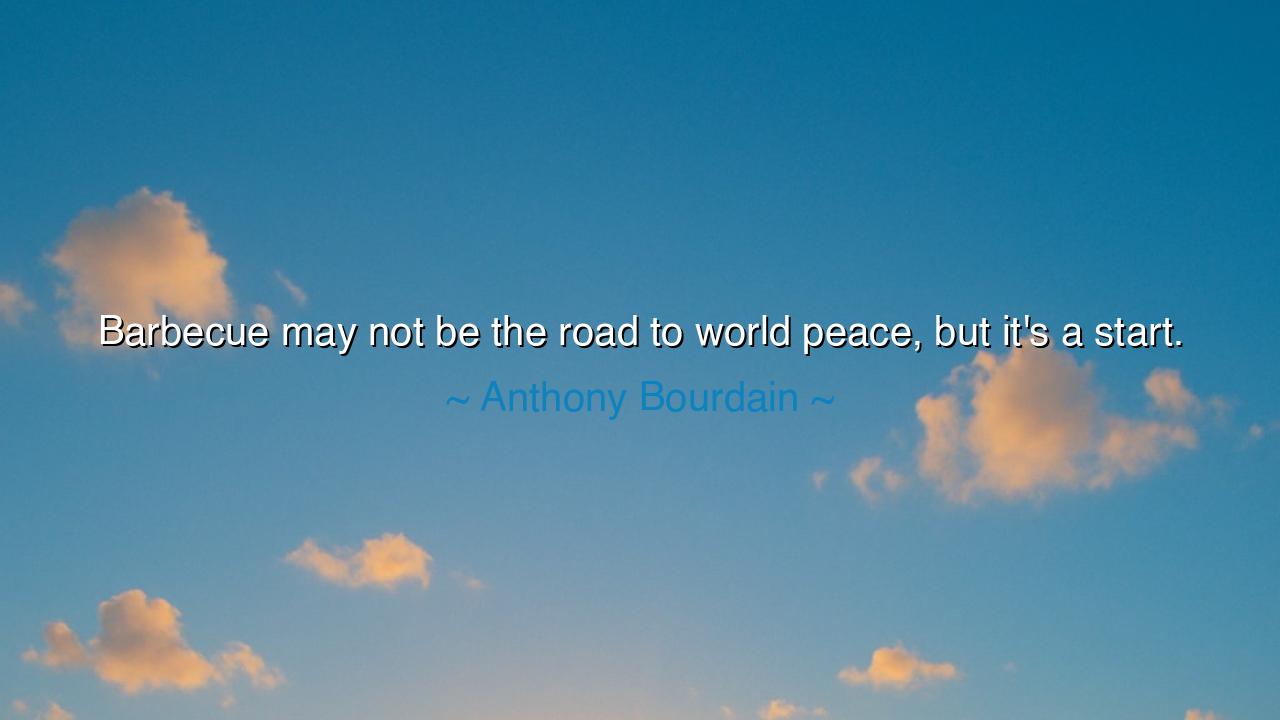
Barbecue may not be the road to world peace, but it's a start.






Anthony Bourdain, wanderer of kitchens and seeker of hidden truths, once declared with a glint of humor and yet profound sincerity: “Barbecue may not be the road to world peace, but it’s a start.” In these words, he pointed not merely to food, but to the power of the shared table, to the alchemy of smoke, fire, and flesh that can dissolve barriers faster than any treaty. Though his tongue was light, his meaning was weighty: that reconciliation often begins not in palaces or courts, but in the humble act of eating together.
When Bourdain speaks of barbecue, he is speaking of more than meat roasted over flame. He is speaking of tradition, of the primal act that unites humanity across cultures. Every people has known the firepit, the gathering around the hearth, the communal feast. In America, barbecue has become a ritual of fellowship; in Korea, it binds friends over smoky tables; in Africa and South America, fire and feast are still the center of kinship. To share barbecue is to share history, to honor an ancient truth: that before nations, men and women gathered around fire and became community.
The wisdom of food as a bridge between peoples is as old as civilization. The ancients knew that to break bread together was to break enmity. In Homer’s tales, even foes who dined at the same table were bound, if only for a time, by sacred laws of hospitality. In the Bible, covenants were sealed by feasts. The Mongols, feared across the steppes, offered fermented mare’s milk to strangers as a sign of acceptance. Each of these gestures reminds us that food speaks where words falter.
History gives us luminous examples. After the long bitterness of the American Civil War, Abraham Lincoln, weary of blood, dreamed of “binding up the nation’s wounds.” He would invite both Northerners and Southerners to the White House table, knowing that meals could soothe the spirit where speeches could not. In our own time, Bourdain himself traveled through lands divided by politics and poverty, sitting with villagers and chefs alike, proving that to share a meal was to share humanity. Barbecue, in its earthy simplicity, became for him a symbol of such hope.
And yet, Bourdain is careful: he does not claim that barbecue is the road to world peace, but that it may be a start. He acknowledges the enormity of conflict, the weight of injustice, the wounds that food alone cannot heal. But he also recognizes that peace begins in small acts—an invitation, a seat at the table, a plate passed across cultures. From such beginnings, greater reconciliations can grow. It is the seed, not the harvest, but every harvest begins with a seed.
The deeper meaning of this quote is that peace is not merely the work of statesmen, but of ordinary people willing to sit side by side. One cannot hate the hand that feeds them; one cannot despise the stranger who shares their fire. In the smoke and laughter of barbecue, in the mess of sauce and the breaking of bones, hierarchies fade, and humanity emerges. To eat together is to admit that we are the same—hungry, mortal, longing for comfort.
So, O listener, take Bourdain’s words to heart: seek peace through the table. Invite neighbors, even those who differ from you, to share a meal. Travel, if you can, not only to see but to taste, to sit at the hearths of other peoples and let their food teach you their soul. If you cannot travel far, then start near: open your door, light your grill, and let fellowship rise with the smoke.
For though barbecue may not be the road to world peace, it is indeed a start—a small, delicious, and profoundly human beginning. And from such beginnings, greater peace can one day grow.






AAdministratorAdministrator
Welcome, honored guests. Please leave a comment, we will respond soon